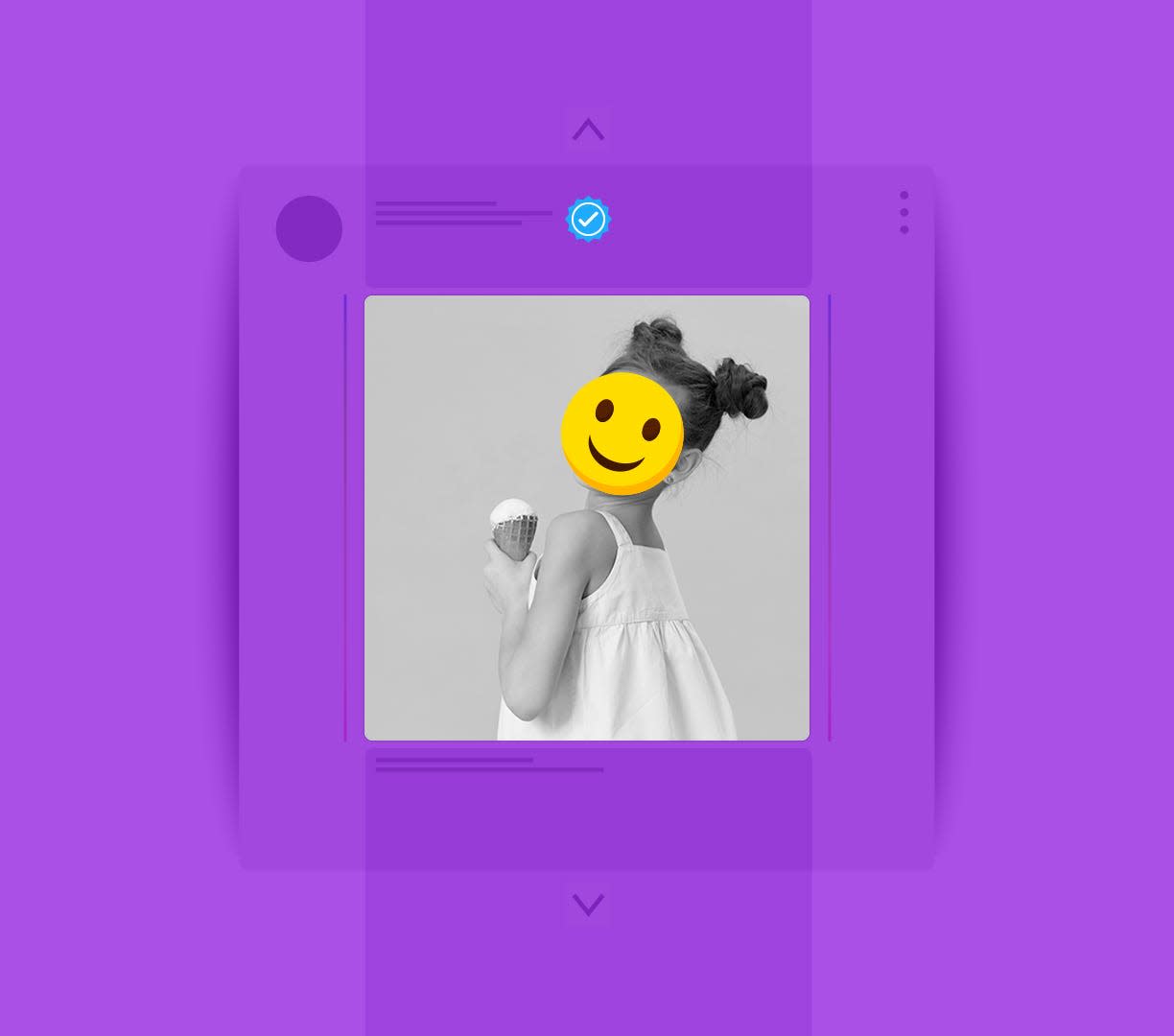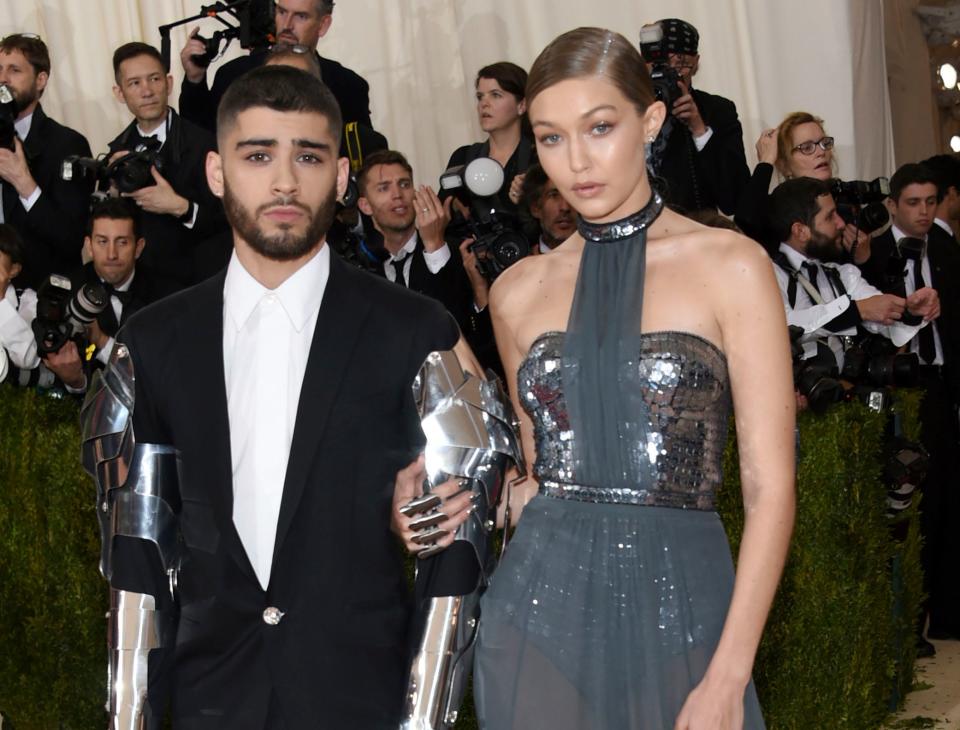Gigi Hadid, Blake Lively hide their kids' faces online. Should other parents follow their lead?

Gigi Hadid issued a plea to paparazzi, media and fan social media accounts, asking that they not share any photos of her and Zayn Malik's 10-month-old daughter, Kai, citing the family's decision to keep her childhood private.
“You know we have never intentionally shared our daughter's face on social media," Hadid wrote last summer on her Instagram Story. "Our wish is that she can choose how to share herself with the world when she comes of age, and that she can live as normal of a childhood as possible, without worrying about a public image that she has not chosen."
More recently, Diane Kruger called out New York paparazzi for photographing the actress with her young daughter, whose name Kruger and partner Norman Reedus have decided to keep private.
"It’s driving me nuts. When I’m with my kid and they take pictures of her I’ve almost hit a few of them,” Kruger told The Sunday Times. “If I see them and they’re brave enough to not walk away, 100 per cent I’m that crazy lady who yells across the street.”
Blake Lively has also called out an Instagram account that posted a paparazzi photo of herself and husband Ryan Reynolds walking with their three daughters.
"This is so disturbing," Lively wrote in the comments of the now-deleted post. "I've personally shared with you that these men stalk and harass my children. And you are still posting. You said you would stop. You personally promised me," she wrote. "This is not casual appreciation. This is YOU also exploiting very young children. Please. Delete. Please."
"Some parents are ok with this. We. Are. NOT," she concluded.
As parents – celebrities and regular folks alike – welcome babies into the age of social media, they face a major decision: Push for anonymity for their young children who did not choose life on social platforms, or include them as a part of their own family “brand.”

Stars such as Prince Harry and Duchess Meghan, Kristen Bell and Dax Shepard, and Mindy Kaling go to great lengths to keep their kids out of the public eye.
The royal family usually issues new portraits of kids on their birthdays, but Harry and Meghan, who have stepped down from senior royal duties, lately have only shared photos of their 2-year-old son Archie that obscure his face. Bell and Shepard place emojis or digital stickers over their children’s faces if they’re posting family photos online, and Kaling usually posts photos of her daughter facing away from the camera.
"In this age, everybody can Google you and gain private information. At some point, you're going to want to protect your privacy and your family," says crisis communications consultant Holly Baird.
"The more celebrities that stick together and fight the powers that be – the paparazzi or whomever is trying to procure images of their private lives and their children – I'm all for it," Baird says. "Obviously if you become a celebrity, you're going to be thrust into the public eye, but you do at least have some sort of shield of anonymity and a normal sense of life to raise your children in privacy."
Sharenting: Should parents post about their children on social media?
The issue of anonymity for children who aren’t able to ask for it themselves isn’t limited just to celebrities, though the increased attention certainly exacerbates it for them.
Famous parents may be more concerned about potential security issues that come with giving the general public access to photos and information about their children, notes Stacey Steinberg, a director and law professor at the University of Florida's Levin College of Law and the author of "Growing Up Shared: How Parents Can Share Smarter on Social Media – and What You Can Do to Keep Your Family Safe in a No-Privacy World." But issues of identity theft, data collection and the potential for their posts to be used as fodder for bullying are things all parents should consider before they post.
"Most parents don't overshare because they're trying to be malicious, they overshare because they don't understand the importance of a digital footprint," she adds. "Or they've decided that the information they're sharing has so much value to family or society that it's worth putting out there."
Debates over children's protection from digital posts they didn't consent to appear in largely predate policy in the U.S. Laws such as the Children's Online Privacy Protection Act (COPPA) or HIPAA, which keeps medical providers from releasing patients' identifying information, put parents in charge of what others are allowed to share about their children. But the world of social media brings about unique circumstances.
The parent is "both the person tasked with protecting the child's private information" and "the person that's potentially benefitting from sharing the information," Steinberg says. "I think that's when some of the danger comes in: When people and especially celebrities or people with large followings use their children's stories to try to monetize their own family business."
Jennifer Garner explains why her teen daughter is too young for Instagram
And: Parents furious with Facebook over Oculus account change
Chrissy Teigen, Gabrielle Union and the case for posting about your kids anyway
Other parents see no issue with “sharenting,” as it has been dubbed: those who share photos, videos and anecdotes about their children on social media.
Chrissy Teigen and John Legend are among the stars who include kids in the "family business": They frequently post about their two young children, Luna and Miles, who are both featured prominently in Teigen's two cookbooks and in one of Legend's recent music videos. Neil Patrick Harris and Neil Burtka's family Halloween costume photos featuring their now-10-year-old twins Gideon and Harper have become a viral hit over the years. Gabrielle Union and Dwyane Wade run an account (@kaaviajames) boasting 1.7 million followers that documents their 2-year-old daughter Kaavia's life since a week after she was born.

Presenting a family-friendly front can also help humanize stars. It can also help them land brand deals.
"It becomes very lucrative if you are able to present that perfect family that every American can relate to and use your child to secure sponsorship and financial gain," Baird adds.
In some cases, such as Union and Wade's posts about their 14-year-old daughter Zaya Wade, who came out last year as transgender, sharenting has led to positive social change. Wade has been open about his journey educating himself about the trans community in hopes that others might learn from him. He has also made it clear that his daughter gave him permission to share her story with the world.
"We know there's other families out there dealing with their kid finding themselves and learning who they are," he reflected last year on "Good Morning America." "I'm not going to sit here and act like we have all the answers. I'm not going to sit here and act like before our child came home and sat us down, that we weren't ignorant parents when it comes to the world. When I say we're learning from our 12-year-old, we're literally learning from our child."
Other people can learn from those instances, too.
Should you post photos of your kids? Experts say it’s a case-by-case basis
Ultimately, experts say there is no one-size-fits-all approach to how parents should deal with sharing their kids' lives online – the key is engaging in conversations about what is best for each family.
Some tips from Common Sense Media on how to engage in safer online family practices:
Limit who can see photos: Adjust your account privacy settings and consider limiting the audience of a post to a smaller group, such as only family members and close friends.
Don't share personal information, such as your address or your child's school.
Understand that internet posts are forever: Once you share something online, another user could save, screenshot or share it.
Consider your kid's digital footprint. Do you think they'll be happy you shared that post in the future?
"There's so much beauty in sharing our stories," Steinberg adds. "There is a lot of power in our narratives. Social change happens because people decide to be brave and vulnerable and to share how certain policies or certain things in this world impact them. … We have to, as a society, find out ways for kids to be able to grow up able to control their digital footprint."
This article originally appeared on USA TODAY: Diane Kruger, Gigi Hadid want kids' privacy. What should parents do?

 Yahoo Movies
Yahoo Movies 
